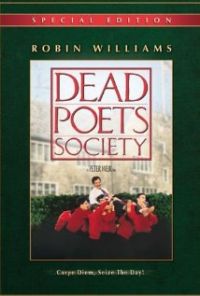A guest post by Jace Sanders.
When I was sixteen, I stood atop my desk surrounded by those considered to be my peers. Everyday in Honors English I felt like a fraud; the other students were much smarter than I. But standing on my desk at that moment, I saw the world differently. I felt inspired, but even more so, I felt like I could inspire. I wanted to excel in academics, to become a scholar. The notion seemed far-fetched at the time, being that my father was a college dropout and his father never attended high school. I resolved to be the first in my paternal line to graduate from a university. Carpe diem.
The inspiration came from watching Dead Poets Society. It was the first time I remember crying during a film. I found that Neil’s tragic suicide left a void in my mind. I craved an alternate resolve-a happy ending. My mind returned again and again to the plot, as if trying to prevent the suicide by working into the story a phone call to Neil’s father or an intervention by Mr. Keating. If only.
Conflict is all around us: in nature, music, relationships, science, math, and life. It can be found everywhere. Through conflict we discover greatness. In writing, without conflict there is no plot, there is no protagonist, and there is no story.
In music, conflict is called dissonance. It is said that Mozart’s father would wake up his son by playing a dissonant chord (a dominant seventh) on the piano. Invariably, Mozart would have to resolve the chord, changing the 7th to the 8th, completing the octave and putting his world in balance.
We crave resolution. Through our choices we seek to resolve hundreds, if not thousands of conflicts each and every day.
In writing, resolution doesn’t necessarily mean that everything is wrapped up nice with a pretty bow on top. At the end of Dead Poets Society, after Neil’s death, and Keating’s termination, the group of young men are faced with a choice-a conflict. They can either continue to let others tell them what to think, or they can seize the day and think for themselves. It started with Todd, the protagonist. He chose, under threat of expulsion, to defy the temporary professor by standing on his desk, facing Mr. Keating, and proclaiming, “Oh Captain! My Captain!” The act inspired a dozen other young men to follow.
At the end of the movie, we don’t know if the students were expelled or if any consequences followed their stunt. As a teenager, my mind wanted confirmation that everything turned out okay. I wanted to know that their lives were better off. The ending doesn’t give me any such assurance, only hope.
The real resolution, and the power of this story, is in the courage and resolve of the Dead Poet’s Society to think for themselves and look at the world in a different way, from another vantage point.
The suicide, though tragic, is a resolution. Neil escaped the conflict between him and his father. The poignant scene is slow and methodical. Even though I know how it ends, I still yearn for a change to Neil’s ritual as he prepares to take his life. I think of the man he could become, but I think in vain. The event hangs out there like a dissonant chord needing to be resolved. As I watch the tragedy unfold, I look for resolution outside of the images I see. I reflect on those people I know who may struggle to follow their heart amidst opposition. I am inspired to find opportunities to make that needed phone call, to offer that hand, to share a kind word and maybe prevent a similar tragedy.
About a year after watching Dead Poets Society, I saw such an opportunity. A friend, who had lost her brother in an accident, seemed to be having an unusually rough day. After pursuing my inclination, she admitted to having taken a handful of pills and was on her way to the bathroom to finish the bottle.
The voice of author Tracy Hickman occasionally pops into my head, asking the question, “Why do I write?” A dramatic pause follows and then I answer, “To inspire.”
I have been inspired by happy and sad endings, and endings in between. Those stories that have inspired me most are those whose endings hang out there like a dissonant chord that only I can resolve.
* * *
Jace Sanders lives in Arizona with his wife and five children. In addition to writing, he enjoys music, photography, and anything outdoors. He holds a Masters in Business Administration from Utah State University and works for a biotech company.


Thanks for the courage to move forward and inspire others!
Very good and perceptive, Jace. Being aware, doing RAKs (Random Acts of Kindness) may greater impact than you could conceive.
Excellent post! I’m only sorry it took me so long to see it. I hope we see more posts from you in the future. Also, excellent film choice. I was telling my kids about it the other day and determined to find it and share it with them.
Wow, very well put. Thnak you for such incredible inspiring words.